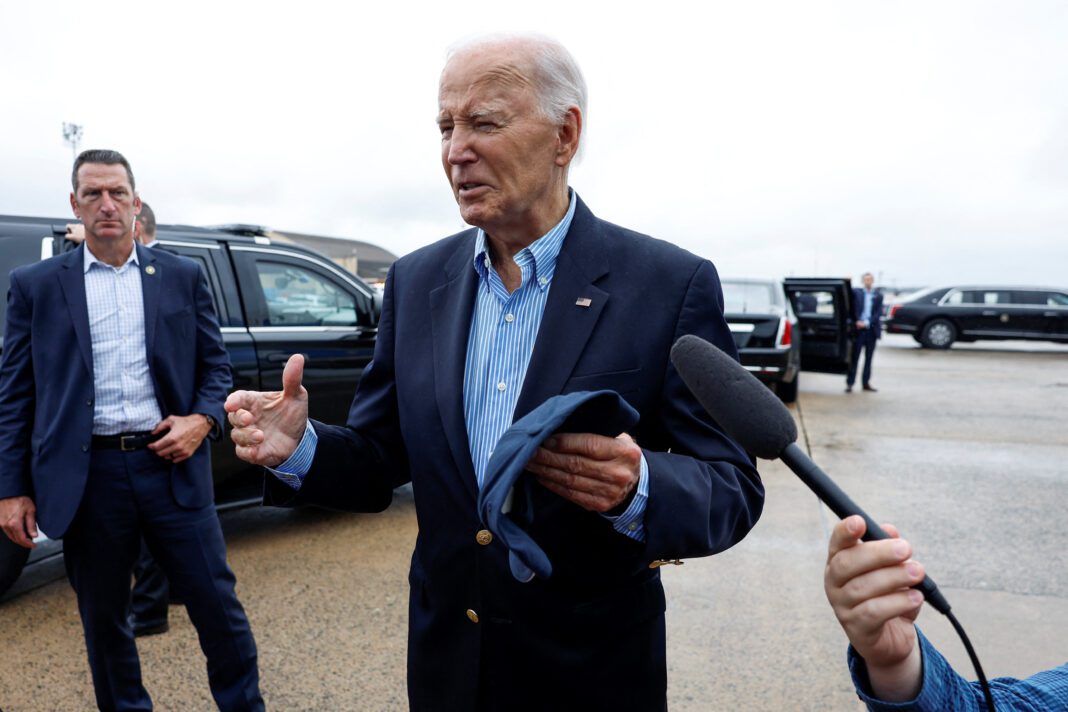President Joe Biden has stated that he would not support an attack on Iran’s nuclear sites, even as tensions between Israel and Iran escalate. This statement comes after Iran launched a missile attack on Israel last night, firing over 200 rockets in retaliation for the killing of a Hezbollah leader in Lebanon. One person, a Palestinian, died in the West Bank from shrapnel caused by the attack.
The U.S. president Biden, alongside other Western leaders, condemned the missile strikes but emphasised that Israel has the “right to respond.” Biden also stressed that any Israeli response must be “proportionate” and added that talks between Israeli Prime Minister Benjamin Netanyahu and G7 leaders would soon take place to discuss Israel’s possible actions.
Iran’s Retaliatory Attack
The missile attack by Iran was a direct response to the assassination of a senior Hezbollah leader in Lebanon by Israeli forces. Hezbollah, a militant group backed by Iran, has been engaged in clashes with Israel over the last few weeks. Israel has conducted airstrikes on Hezbollah targets in Lebanon, leading to significant tensions in the region.
In his statement following the missile attack, Israeli Prime Minister Netanyahu called it a “big mistake” and vowed that Iran would “pay” for its actions. While Israel has yet to retaliate, Netanyahu’s comments suggest that a strong response may be imminent.
Iran’s Warning to Israel
Iranian President Masoud Pezeshkian warned that his country could launch a stronger attack if Israel retaliates. He also stated that Iran is not seeking to go to war with Israel. Tehran has asked the U.S. and European leaders to push Israel toward a ceasefire. By warning of further escalation if Israel responds to the missile strikes.
Hezbollah and Israeli forces have been involved in several skirmishes along the Lebanon-Israel border. This conflict intensified after Israel launched airstrikes and a ground invasion in Gaza following the October 7 attacks by Hamas. Iran has been a key supporter of Hezbollah, providing funding and weapons.
Escalating Conflict in the Region
In recent days, Israel has also expanded its military operations in Lebanon, targeting areas around Beirut in response to continued attacks by Hezbollah. The Israeli Defense Forces (IDF) have focused on eliminating high-ranking Hezbollah leaders through targeted assassinations. The escalating violence has drawn criticism from several countries in the Middle East, as well as calls for a ceasefire.
Qatar’s Emir, Sheikh Tamim, has warned that Israel’s actions are bringing the Middle East to the “brink of the abyss.” Qatar had been brokering a ceasefire agreement in Gaza, but these negotiations collapsed as violence escalated across the region.
G7 Condemns Iran’s Attack
The G7, which includes the leaders of the U.S., UK, Canada, France, Germany, Italy, and Japan, held an emergency call in response to the missile attacks. In a joint statement, the group strongly condemned Iran’s missile strikes on Israel.
President Biden reaffirmed the U.S.’s “ironclad commitment” to Israel’s security. By expressing full solidarity with the Israeli people. British Prime Minister Keir Starmer also condemned the attacks on civilians, calling it a threat to Israel’s right to defend its citizens.
Calls for Ceasefire and Two-State Solution
Leaders across the Middle East, including from Lebanon, Saudi Arabia, and Jordan, have urged for a ceasefire between Israel and the various militant groups in the region. There has been increasing pressure from these nations for Western countries to push Israel to halt its military operations in Lebanon and Gaza.
In recent days, both Saudi Arabia and Jordan have called for renewed discussions on a two-state solution between Israel and Palestine. This call has gained support from the European Union and countries like Ireland, who see it as a potential path to ending the long-standing conflict.
Israel’s Response Awaited
As of now, Israel has not responded to Iran’s missile attack. Prime Minister Netanyahu warned last night that “whoever attacks us, we attack them,” signaling that military action could be on the horizon. With tensions running high and international pressure mounting, the situation in the Middle East remains fragile.
The world is watching closely to see if Israel will retaliate and what the broader consequences of this escalating conflict might be. Leaders from the West and the Middle East alike are urging caution to prevent the violence from spiralling further.

